- Fisher’s Top 500 Final Rankings
- Fisher’s Top 400 for May
- Fisher’s Top 350 for April
- Fisher’s Top 300 for March
- Fisher’s Top 217 for February
- Fisher’s Top 217 for January
- Fisher’s Top 186 for December
- Fisher’s Top 186 for November
- Fisher’s Top 124 for October
- Fisher’s Top 124 Preseason Rankings
My final rankings have been published for a couple weeks now and I’m still happy with them, which isn’t always the case. Sometimes my order changes from one day to the next — within tiers and particularly among my first-round contenders this year — but I’ve remained surprisingly content with the finished product, considering the difficult decisions I had to make down the stretch and right down to the wire.
Finalizing the order for those first-round contenders — from 21 to 45 — certainly kept me up at night. I lost sleep over those decisions and some of the last-minute shuffling that took place within that tier in order to feel fully satisfied. Several of those prospects felt interchangeable throughout the draft year, but I’m confident in the order that I settled on to stand the test of time.
The risers from my final rankings for the 2020 NHL Draft feature the three prospects that forced their way into my first round — my top 31 — as well as four power forwards that were lingering a little too low for my liking, two centres from the WHL that I believe will become good pros, and an American defender that kept growing on me with every glimpse that I got of him.
RELATED: 10 Fallers from Fisher’s Final Rankings
1) Ryan O’Rourke (LD, Canada, Sault Ste. Marie OHL)
MAY RANKING: 41
FINAL RANKING: 23
VARIATION: +18
ANALYSIS: This may look like a massive bump for O’Rourke but, trust me, it has been months in the making. He has been trending up since the CHL Top Prospects Game back in January — more so in my mind than in my rankings, evidently. He popped for me in that showcase — flashing more offensive potential than I previously envisioned, displaying impressive puck-moving ability to complement his strengths as a shutdown defender — and that is precisely when I started thinking of O’Rourke as a first-round talent. I hinted at that in my recap and again in highlighting O’Rourke as one of the 10 prospects that could have boomed at the under-18 worlds. That piece, published on March 16 as the hockey world came to a screeching halt, suggested O’Rourke could have rose into the first round with another strong showing at that tournament as a go-to guy for Canada. Many of the other prospects from that piece already received their bump in my rankings — including fellow blueliners Joni Jurmo and William Wallinder becoming first-rounders for me — but better late than never for O’Rourke, who was also labelled the ‘steal of the draft’ by my trusty THW colleague Mark Scheig. When it really came down to it, O’Rourke felt like he belonged in my first round — and solidly in my first round, at No. 23 — based on how he elevated his two-way game at the TPG and the fact he captained the Soo Greyhounds during his draft year, which speaks to his character and leadership. That is no small feat and I will always value those intangibles. O’Rourke has nice size too, but I do see offensive upside and that is ultimately what thrust him into my top 31.
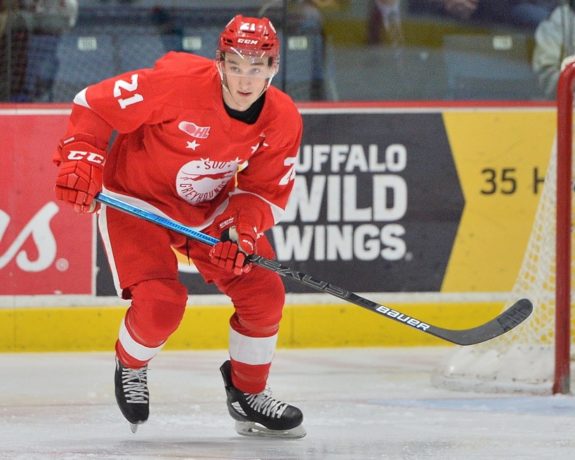
2) Brendan Brisson (LC/LW, USA/Canada, Chicago USHL)
MAY RANKING: 37
FINAL RANKING: 28
VARIATION: +9
ANALYSIS: Brisson became a steady riser for me in the second half as I began to see him as a centre at the pro level. Prior to that and even coming out of the World Junior A Challenge, I had Brisson pegged as a winger for the future, which perhaps held him back in my rankings. I try to avoid positional bias — centres are more valuable than wingers and right-handed defencemen are more coveted than lefties — but those realities do influence my rankings to some degree. I knew Brisson had a potent shot — particularly his one-timer on the power play — but his skating seemed average and he didn’t stand out as an even-strength driver in my earlier viewings. By the end of the season — when I circled back to the USHL following the shutdown, with a focus on that juggernaut Chicago team full of draft-eligible talent — Brisson was clearly pushing the pace and had more pep in his step. Brisson is quite polished from growing up around pros (his dad is super agent Pat Brisson, whose clients include Sidney Crosby and Nathan MacKinnon) and his hockey IQ is at a high level — both in terms of vision and anticipation, reading and reacting. Brisson is thinking one step ahead, even if his skating isn’t anything special. Perhaps a Paul Stastny type in that sense, and Brisson’s playmaking is progressing, but his shooting ability remains his best attribute in the present. Truth be told, Brisson became a first-rounder for me because of that centre factor — the belief that he’ll be able to drive play and be productive down the middle in the NHL rather than relying on his shot off the wing. Brisson changed my mind and that made him worthy of my top 31.
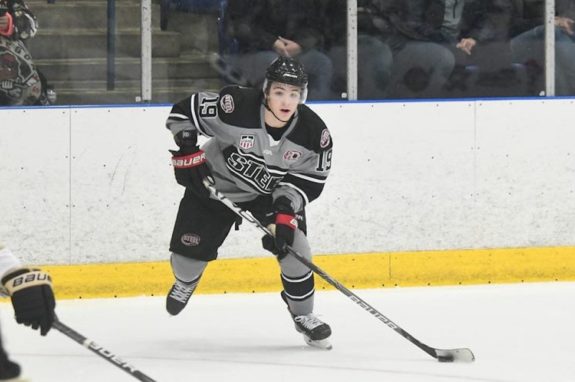
3) Tyson Foerster (RW, Canada, Barrie OHL)
MAY RANKING: 40
FINAL RANKING: 29
VARIATION: +11
ANALYSIS: Foerster and Brisson moved up together and for much the same reasons. Both became drivers in the second half, with Foerster becoming a go-to guy for Barrie following his MVP performance at the CHL Top Prospects Game. Like Brisson, I saw Foerster as a shooter with suspect skating, but he showed me another side — another gear of sorts — after the OHL trade deadline, when Ryan Suzuki and others were shipped out. Foerster stepped up as an offensive catalyst for the Colts, generating scoring chances for himself and his linemates off the rush and in all situations. Barrie is going to be much better next season and Foerster will be the driving force there. He is a top-five shooter in this draft class, but Foerster’s all-around game has come a long way — so has his skating — and he has a lot of tools to be effective in the NHL. For comparables, I look at two Vancouver Canucks wingers — both of whom were first-round picks — in Barrie alum Tanner Pearson as a secondary scorer who can contribute in all situations and Brock Boeser as a front-liner who could net 40 goals in the years to come. Foerster may top out somewhere between Boeser and Pearson is my thinking, but that will still make him a valuable top-six forward.
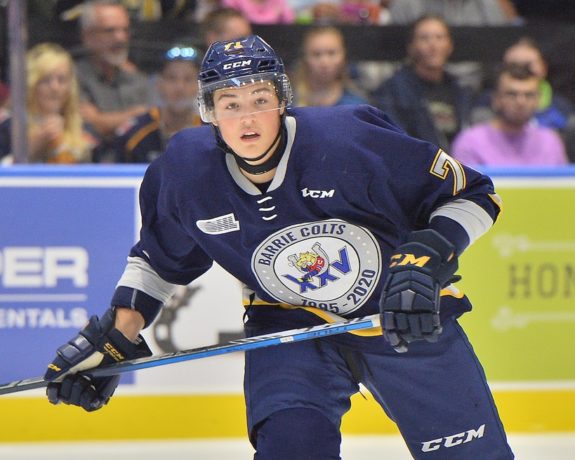
4) Sam Colangelo (RW, USA, Chicago USHL)
MAY RANKING: 52
FINAL RANKING: 44
VARIATION: +8
ANALYSIS: Colangelo also has a ton of translatable tools, which could get him taken in the first round. He moved up into that tier of first-round contenders (21-45) for the first time in my final rankings as a result. Colangelo is more than a big body and a man among boys in junior, proving to be the total package as a power forward in my latter viewings. There is lots to like and he’ll continue to develop in a terrific program at Northeastern, facing more of a challenge against men in the college ranks. That will be an adjustment and the production might not be there as a freshman — Brady Tkachuk and Dylan Holloway were both limited to eight goals as NCAA rookies, enduring some difficulties in making that leap for their draft year — but I expect Colangelo to eventually hit his stride and become an impact player at that level. I foresee Colangelo spending at least a couple and perhaps a few seasons in college, growing his overall game and graduating as a reliable top-six forward for the NHL. I don’t know how much he’ll score as a pro, but Colangelo will carve out an important role.
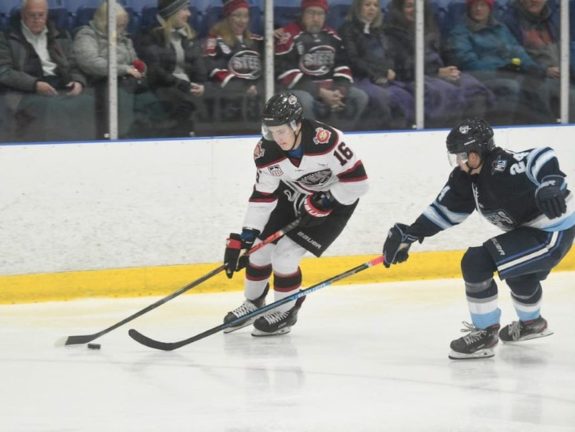
5) Roby Jarventie (RW, Finland, Ilves Liiga)
MAY RANKING: 72
FINAL RANKING: 54
VARIATION: +18
ANALYSIS: Jarventie was flying under the radar for me — playing primarily for KOOVEE in the Mestis, netting 23 goals in 36 games and producing at over a point-per-game pace in that men’s league with 38 points — but his stat-line combined with his August birthdate as one of the younger prospects in this draft class was convincing enough to climb into my second-round range. Jarventie was already in that tier of second-round candidates but now he is on the higher end (46-80) for my final rankings. I wouldn’t be surprised if he was selected in the top 50.
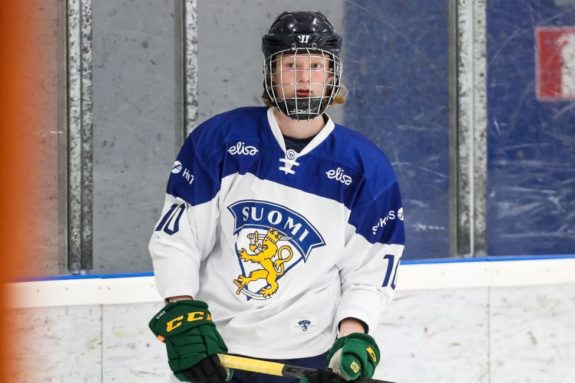
6) Tristen Robins (RC, Canada, Saskatoon WHL)
MAY RANKING: 78
FINAL RANKING: 61
VARIATION: +17
ANALYSIS: Robins was another late riser for me — going from a third-rounder to a second-rounder in my eyes. I’ve always liked Robins but honestly didn’t realize he was on such a tear in the second half — posting the second-best points per game among WHL draft-eligibles after Christmas, behind only Seth Jarvis. Robins racked up 54 points over his last 33 games — a torrid three-month stretch from Dec. 7 through March 10. My lone live viewing of Robins from last season — Saskatoon didn’t come to Kelowna this season — was also very impressive. In fact, he outshone Kirby Dach on that night, scoring a highlight-reel goal in Saskatoon’s 5-4 overtime win here on Dec. 1, 2018. I’ve made the Brayden Point comparison a couple times — seeing similarities in their playing style and suggesting Robins could be a Point-type steal in the third round — but now I’m thinking Robins will be gone by the third round, with the potential to go in the top 50.

7) Brandon Coe (RW, Canada, North Bay OHL)
MAY RANKING: 76
FINAL RANKING: 66
VARIATION: +10
ANALYSIS: Coe had a good season on a bad team but was at his best during the CHL Top Prospects Game, opening everyone’s eyes to his upside as a big man with soft hands, strong skating and a skill-set that screams pro. I don’t know how high Coe will go, but I wouldn’t rule out the possibility of a team reaching for him in the second round. There is something there with Coe and you can’t help but wonder where he’d be ranked had he been surrounded by a better supporting cast in North Bay. Would he have been in the first-round conversation? Maybe. Coe’s stat-line warrants praise, all things considered, but NHL teams will have taken notice of his pro tools and will be projecting his development five years from now as part of their assessment. That could bode well for Coe come draft day.

8) Jack Finley (RC, Canada, Spokane WHL)
MAY RANKING: 77
FINAL RANKING: 68
VARIATION: +9
ANALYSIS: Finley stayed in my third-round range throughout the draft year and ended up almost exactly where he started in my preseason rankings (67). He could go higher as one of the biggest and youngest prospects in this draft class — standing 6-foot-6 and born in September, with NHL bloodlines also boosting his stock — but I’m comfortable with him as an early third-rounder. Finley skates well for his size and plays an efficient 200-foot game, though he isn’t overly physical and could use that size more to his advantage on the forecheck. He does hold his own as a net-front presence on the power play, but I’d like to see him get a bit meaner to create more space for himself and his linemates. That should come with time and maturity as part of his development going forward. Finley played a variety of roles for Spokane during his draft year — starting out as a shutdown guy before centering WHL scoring leader Adam Beckman — so he is still figuring out what kind of player he’ll be as a pro. I’d like to see him pattern his game after Adam Lowry — thus the mean element — but he does have the playmaking ability to perhaps become a poor man’s Ryan Johansen or Sean Couturier. Regardless, I am confident that Finley will be a player — an NHLer of some sort. I see him as a fairly safe pick, possessing a high floor as a bottom-six centre with a decent amount of upside.
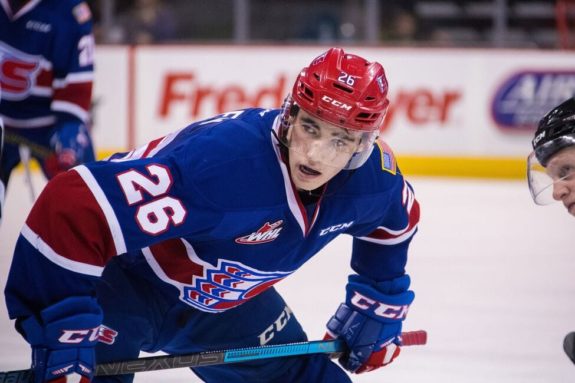
9) Mitch Miller (RD, USA, Tri-City USHL)
MAY RANKING: 89
FINAL RANKING: 78
VARIATION: +11
ANALYSIS: Miller is this year’s Zac Jones, coming from the same USHL Tri-City program. Jones was a third-rounder, 68th overall in 2019, and I expect Miller to go in that same range. Jordan Harris, also a third-rounder at 71st overall in 2018, is another name that comes to mind for Miller. I was too low on Jones (123) and Harris (92) in my final rankings for their respective draft years, so I didn’t want to make that mistake again with Miller. I see similarities to both Jones and Harris. The big difference is Miller is right-handed — the other two are lefties — which could lift Miller into the second round. I had Miller wrongly listed as left-handed for most of the draft year and that handedness discrepancy was, admittedly, part of the reason I elevated him into my tier of second-round candidates (46-80) for the final rankings. That and the fact Miller will be in good hands at the University of North Dakota, which has developed a number of NHL defencemen over the last decade.
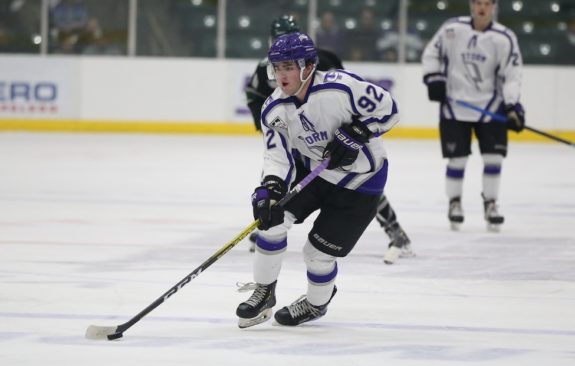
10) Egor Sokolov (RW, Russia, Cape Breton QMJHL, overager)
MAY RANKING: 105
FINAL RANKING: 96
VARIATION: +9
ANALYSIS: Sokolov also moved up a tier for my final rankings — putting himself in the mix to be the top overager for 2020, along with Evgeniy Oksentyuk (89), Nico Daws (92) and Alex Cotton (94). Those four finished within seven spots of each other among my tier of potential third-rounders (81-97). I could see all four cracking the top 100 and I wouldn’t be shocked if one or more of them went in the top 75. Sokolov, as a double-overager in his final year of eligibility after going undrafted in 2018 and 2019, could be the first of those names called thanks to his beastly performance at the World Juniors. Sokolov always had the size and the shot, but his skating was poor to put it politely. Part of that was probably conditioning and with more commitment to being a pro this season, Sokolov was keeping up just fine at the World Juniors and proving tough to contain for all of Russia’s opponents. He made significant strides with his skating — and presumably took a big step with his conditioning — so the third time should be the charm for Sokolov and he might just emerge as this year’s top overager. Fellow Russian import Pavel Gogolev (157, 13th overager for me) is in the same boat as a third-timer, also much improved in the skating department and another perceived challenger for that title of top overager.

Honourable Mentions
NOTE: Here are 13 more double-digit risers from within my top five rounds.
Cross Hanas (LW, USA/Canada, Portland WHL)
MAY RANKING: 118
FINAL RANKING: 108
VARIATION: +10
Oskar Magnusson (LC/RW, Sweden, Malmo J20)
MAY RANKING: 141
FINAL RANKING: 109
VARIATION: +32
NOTE: I had Swedish forwards at 71 and 141 for May with none in between — none in the fourth round — which didn’t feel right. I knew I liked Magnusson and felt comfortable moving him up a full round. I also knew I had a couple other Swedish forwards on the rise for the fifth round.
Ethan Cardwell (RC, Canada/USA, Barrie OHL)
MAY RANKING: 142
FINAL RANKING: 117
VARIATION: +25
Jack Thompson (RD, Canada, Sudbury OHL)
MAY RANKING: 143
FINAL RANKING: 118
VARIATION: +25
Dylan Garand (G, Canada, Kamloops WHL)
MAY RANKING: 147
FINAL RANKING: 127
VARIATION: +20
NOTE: I’m a fan of Garand — he’s my top WHL goaltender for 2020, seventh among first-time eligibles at his position and now eighth overall among netminders. Garand had been in that top 10 all year — mostly stuck at 10th, behind two more overagers in Samuel Hlavaj (128) and Amir Miftakhov (129) — but I bumped him up into a grouping of five goalies to start the fifth round for my final rankings. Garand may not be the tallest ’tender, but he’s as competitive as they come — on and off the ice, as a fitness freak and a stellar scholar too.
Hugo Styf (LD, Sweden, MODO J20)
MAY RANKING: 171
FINAL RANKING: 136
VARIATION: +35
Victor Mancini (RD, USA, Frolunda J20)
MAY RANKING: 169
FINAL RANKING: 137
VARIATION: +32
Ethan Edwards (LD, Canada, Spruce Grove AJHL)
MAY RANKING: 192
FINAL RANKING: 140
VARIATION: +52
NOTE: Edwards was a kid that I circled back on after referencing my notes from the World Junior A Challenge where I liked him every bit as much as Michael Benning with Canada West. Edwards just turned 18 this month and is bound for Michigan as part of that wicked recruiting class, so I wanted to get him into the top 150 for my final rankings.
Donovan Sebrango (LD, Canada, Kitchener OHL)
MAY RANKING: 155
FINAL RANKING: 142
VARIATION: +13
Artem Shlaine (LC, USA/Russia, Shattuck St. Mary’s U.S. High School)
MAY RANKING: 197
FINAL RANKING: 152
VARIATION: +45
Mark Hillier (LC, Canada, St. Andrew’s College High School)
MAY RANKING: 250
FINAL RANKING: 153
VARIATION: +97
NOTE: Hillier came onto my radar later in the draft year — I’ve never been ahead of the game on high-schoolers — but he broke Warren Foegele’s scoring record for St. Andrew’s this season after previously outproducing Matthew Stienburg as a teammate last season when Stienburg was the first pick of the third round (63rd in 2019). Foegele was also a third-rounder out of St. Andrew’s, 67th in 2014. Those facts are telling towards Hillier getting drafted and perhaps a lot higher than I wound up ranking him. For the record, Hillier had 52 goals and 112 points in 56 games this season — averaging two points per game.
Elliot Ekmark (LC, Sweden, Linkoping J20)
MAY RANKING: 168
FINAL RANKING: 154
VARIATION: +14
Oliver Tarnstrom (LC, Sweden, AIK J20)
MAY RANKING: 220
FINAL RANKING: 155
VARIATION: +65
NOTE: Tarnstrom was another big-time riser for me, as a tantalizing talent on a pretty poor AIK team. Tarnstrom is gifted offensively and also happens to be one of the youngest prospects in this draft class — only eligible for 2020 by a couple of weeks with his Aug. 30 birthdate. With a better supporting cast, we might have been talking about Tarnstrom as a top-100 pick, but I managed to get him into the fifth round at least for my final rankings.
Get the latest NHL Draft & Prospect rankings, news and analysis